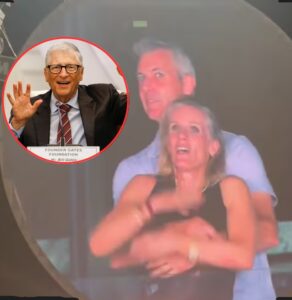Bill Gates Weighs In on Coldplay “Couple Cam” Debacle, Calls It Bigger Risk Than AI for CEOs

What began as an ordinary night of music and lights at a Coldplay concert in Boston has erupted into one of the most talked-about scandals in corporate circles this year—thanks to a single camera sweep and the unexpected involvement of Bill Gates.
It all unfolded during the show’s infamous “Couple Cam,” a segment designed to spotlight lovebirds in the crowd. But when the lens landed on Section 308, it didn’t just capture a sweet kiss — it unearthed a brewing controversy.
Seated side by side were Andy Byron, CEO of tech giant Astronomer, and Kristin Cabot, the company’s head of HR. Their awkward reactions, combined with a failed attempt at appearing nonchalant, instantly triggered alarms across social media. It didn’t take long for internet sleuths to identify the pair — and even quicker to reveal that Byron was married… just not to Cabot.
Within hours, the video clip had gone viral, dissected frame by frame by millions. As the digital wildfire spread, speculation grew — until it reached an unexpected voice: Bill Gates.
While the Microsoft co-founder usually stays away from public gossip, he made a rare exception for this viral phenomenon. Posting privately but inevitably leaking to the public, Gates shared a screenshot from the concert with a dry caption:
“AI is scary, but Couple Cam might be scarier. Tread carefully.”
His tongue-in-cheek remark exploded online, with fans, tech moguls, and celebrities reposting it, turning the quip into an overnight catchphrase. The post was hailed as both hilarious and strangely wise — a reflection on how even the smallest public moment can spiral into global headlines.
Gates, no stranger to the microscope of fame, seemed to be speaking from experience. His own high-profile divorce had placed his personal life under intense scrutiny — making his response to the Coldplay incident resonate on a deeper level.
But Gates wasn’t done. Speaking days later at a tech leadership forum in San Francisco, he doubled down with another jab:
“Some executives need firewalls for their personal lives, not just their servers.”
The audience roared.
Back at Astronomer, things were anything but amusing. The board quickly called an emergency meeting, leading to Byron being asked to temporarily step aside as the company launched an internal review. Reports confirmed they were investigating whether the CEO’s relationship with Cabot breached company policies — particularly those concerning romantic relationships between executives and direct reports.
Cabot, meanwhile, vanished from social media and took a leave of absence, as online backlash mounted.
Coldplay themselves seemed aware of the chaos sparked by their concert. At a subsequent show, frontman Chris Martin joked to the crowd:
“Let’s try not to ruin anyone’s career tonight.”
The crowd erupted — they knew exactly what he was referring to.
What started as a light-hearted gimmick transformed into a cautionary tale about public exposure and personal conduct. Gates’ commentary struck a chord because it wasn’t just funny — it underscored a harsh reality in the digital age: reputations are fragile, and privacy is fleeting.
Analysts and HR experts took note. The debacle has already triggered discussions in boardrooms across industries about how workplace ethics and personal behavior intersect — especially when employees are in the public eye.
And just like that, a concert meant to bring joy became a mirror reflecting the challenges of modern leadership, viral culture, and human fallibility. Social media users even coined a new term:
“You’ve been Coldplayed” — shorthand for being publicly exposed in a humiliating moment captured on camera.
As for Bill Gates, his sardonic wit and cultural savvy earned him praise for being both insightful and relatable. Having endured his own media storms, his perspective added weight to what could have remained just a celebrity scandal. Instead, his remarks sparked a broader conversation about leadership, responsibility, and the price of being seen.
Ultimately, one camera pan turned a CEO’s mistake into a global lesson — and a reminder from Gates that in today’s world, “proceed with caution” is more than just good advice. It might just be survival.